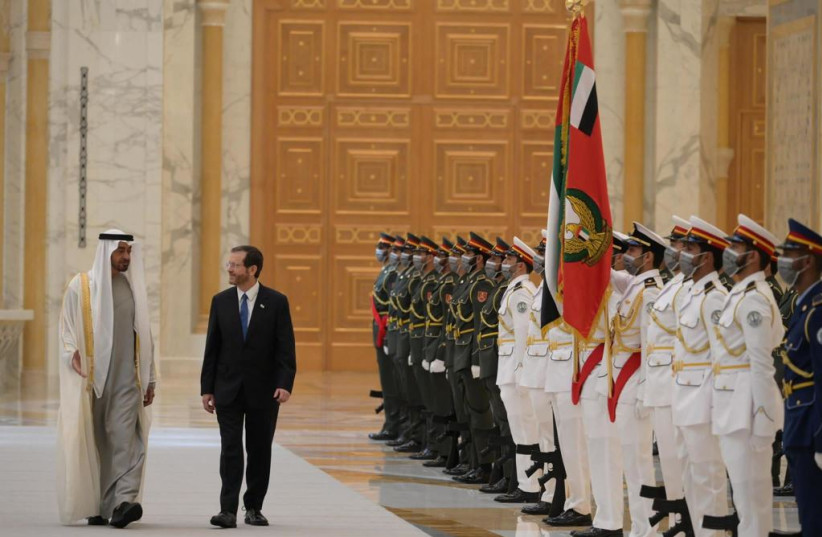Air defenses intercepted a ballistic missile fired by the Iran-backed Houthis over Abu Dhabi in the United Arab Emirates as President Isaac Herzog was conducting an official visit to the country on Sunday night.
The reports of air defenses being activated came out shortly after the Houthis announced they would be releasing details about a large-scale military operation “in the depths of the UAE.”
The missile fell harmlessly in an unpopulated area, the Emirati Defense Ministry said.
Air traffic was continuing normally and all flights were operating as usual, the UAE General Civil Aviation Authority said, according to Emirati state news outlet WAM.
Shortly after the attack, the Saudi-led coalition fighting the Houthis in Yemen said it had destroyed a ballistic missile launchpad in the Jawf Governorate in Yemen. Footage of the attack on the launchpad was shared on social media by the Emirati Defense Ministry.
The Saudi-led coalition launched a series of intense airstrikes on Sana’a, Yemen’s capital, early Monday morning, according to Houthi-affiliated Al-Masirah news.

Herzog was updated about the incident, and he and his entourage were safe. The visit is expected to continue as planned.
The Houthis took responsibility for the attack on Monday morning, calling it the “Third Hurricane of Yemen Operation.” The other two recent Houthi attacks on the UAE were also called Hurricane of Yemen.
Despite only one ballistic missile being intercepted over the UAE overnight, Houthi military spokesman Yahya Saree said the Houthis had fired a number of ballistic missiles and drones and hit targets in Abu Dhabi and Dubai.
“The armed forces affirm that the state of the Emirati enemy will remain unsafe as long as the tools of the Israeli enemy in Abu Dhabi and Dubai continue to launch aggression against our people and our country,” he said, repeating a warning to civilians and companies to stay away from vital facilities that could be targeted.
In response to the attack, New Hope MK Zvi Hauser reiterated his calls for Israel to declare the Houthis a terrorist organization.
“Tonight’s attack was not just an attempt to harm the Emiratis, but an attempt to damage relations between the two countries [Israel and the UAE] and disrupt an Israeli president’s first visit to the country,” he tweeted.
Hauser had previously proposed that Israel do so in solidarity with the UAE.
“The Houthis have an ideology that is hostile to Israel and the West and tout the slogan, ‘Death to America, death to Israel, a curse on the Jews and victory for Islam,’” he said at the time, adding that this was originally an Iranian motto.
“Their desire to strike Israel, as the long arm of Tehran, is proven,” Hauser said. “Iran stands behind the organization and helps it economically and militarily, providing it with weaponry and training its people.”
The US State Department condemned the Houthi attack on Abu Dhabi while Herzog was visiting the country.
“While Israel’s president is visiting the UAE to build bridges and promote stability across the region, the Houthis continue to launch attacks that threaten civilians,” State Department spokesman Ned Price tweeted.
The attack came a week after the UAE intercepted two ballistic missiles fired by the Houthis toward it.
For more than six years, the Houthis have been battling a Saudi-led coalition that includes the UAE, repeatedly carrying out cross-border missile and drone attacks on Saudi Arabia and launching an unprecedented assault on the UAE on January 17.
Three civilians were killed and another six were wounded in the January 17 attack. Three fuel tankers exploded in Abu Dhabi’s Musaffah industrial area near the storage facilities of oil firm ADNOC, and a fire broke out at a storage facility at Abu Dhabi International Airport. Flights were temporarily suspended.
The attack was reportedly carried out with a number of ballistic missiles and drones.
Lahav Harkov and Reuters contributed to this report.
